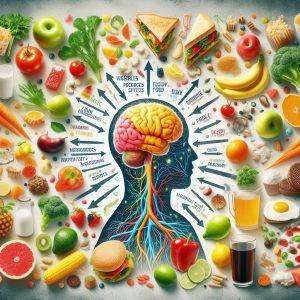Introduction
The saying “You are what you eat” holds a profound truth. Your eating habits play a pivotal role in shaping not only your physical health but also your mental well-being and overall quality of life.
In an era where convenience often takes precedence over nutrition, it’s crucial to comprehend the profound impact that your dietary choices have on your health.
In this article, we delve deeper into understanding how eating habits can influence various aspects of your health.
Let’s dive in, shall we?
What is the Relationship Between Eating Habits and Health?
Eating habits significantly shape your health outcomes. They determine the types and quantities of nutrients your bodies receive, which in turn affect various bodily functions.
Key nutrients such as vitamins, minerals, protein, carbohydrates, and fats play essential roles in maintaining optimal health.
Positive eating habits, such as consuming a balanced diet rich in whole foods, promote health and well-being, while negative habits, like excessive consumption of processed foods and sugary beverages, can lead to adverse health effects – such as chronic diseases like diabetes, cardiovascular diseases, and certain cancers.
The Foundation of Nutritional Wellness
The foundation of nutritional wellness encompasses various aspects that contribute to your overall health and well-being.
Here are some key aspects of building strong nutritional wellness that you should know:
- Hydration
Adequate hydration is fundamental for maintaining optimal bodily functions. Water plays a crucial role in regulating body temperature, aiding digestion, transporting nutrients, and flushing out toxins. Use water ionizers to balance the pH qualities of your drinking water.
It is essential to drink an adequate amount of water throughout the day to stay hydrated. Individual water needs may vary based on factors such as age, weight, activity level, and environmental conditions.
- Mindful Eating
Mindful eating involves paying attention to the sensory experience of eating and being present at the moment during meals.
It emphasizes awareness of hunger and fullness cues, as well as recognizing the emotional and environmental factors that influence your eating behaviors.
Practicing mindful eating can help you cultivate a healthier relationship with your food, promote better digestion, prevent overeating, and enhance your overall satisfaction with meals.
- Balanced Diet
A balanced diet consists of a variety of nutrient-dense foods from all food groups in appropriate proportions. It includes fruits, vegetables, whole grains, lean proteins, and healthy fats, providing essential nutrients such as vitamins, minerals, fiber, and antioxidants.
Consuming a balanced diet supports your overall health, helps maintain a healthy weight, reduces the risk of chronic diseases, and helps you attain optimal energy levels and vitality.
What are The Risks of Poor Eating Habits?
Poor eating habits can cause multiple health risks which are not limited to:
- Chronic Diseases
Poor eating habits elevate your risk of chronic conditions like obesity, diabetes, heart disease, and certain cancers due to high intake of processed foods, sugars, and unhealthy fats.
- Weakened Immune System
Inadequate nutrition compromises your immune function, increasing susceptibility to infections and illnesses, as essential vitamins and minerals are crucial for your immune health.
- Physical & Cognitive Function
Nutrient deficiencies impair your physical energy, cognitive function, and mental clarity, leading to fatigue, poor concentration, and decreased productivity in your daily tasks.
- Mental Health
Unhealthy diets contribute to mental health issues such as depression and anxiety, while balanced nutrition supports your brain function and mood stability through the consumption of fruits, vegetables, and omega-3 fatty acids. If you need holistic treatment, check this article about Red Door Life and how it can help your recovery.
- Energy Levels
Poor eating habits cause energy fluctuations, resulting in fatigue and decreased performance. Diets high in refined sugars and processed foods lead to rapid spikes and crashes in blood sugar levels, affecting your energy levels throughout the day.
- Nutritional Imbalances
Unbalanced diets lacking essential nutrients result in nutritional deficiencies, leading to various health problems. Essential vitamins, minerals, and antioxidants are necessary for your overall health and well-being, and neglecting them can have adverse effects on your health.
What Are the Benefits of Maintaining Healthy Eating Habits?
Here are the 5 main benefits of maintaining healthy eating habits:
- Improved Physical Health
Healthy eating habits reduce your risk of chronic diseases like heart disease, diabetes, and certain cancers, promoting your overall well-being and longevity.
- Enhanced Mental Well-being
Nutrient-rich diets support your brain health and mood stability, reducing your risk of depression and anxiety while promoting your cognitive function and emotional resilience.
- Sustained Energy Levels
A balanced nutrition provides you with sustained energy throughout the day, preventing energy crashes and fatigue, commonly associated with unhealthy diets high in refined sugars and processed foods.
- Optimal Weight Management
Healthy eating habits support your weight management goals by promoting satiety, regulating appetite, and providing essential nutrients, helping you to maintain a healthy body weight and prevent obesity-related health issues.
- Improved Quality of Life
Maintaining healthy eating habits also leads to an overall improved quality of life, with increased vitality, productivity, and longevity, allowing you to enjoy your life to the fullest.
Now that you’ve understood the benefits of maintaining healthy eating habits and the limitations that come with maintaining a poor one, how can you improve your eating habits?
Strategies for Improving Your Eating Habits
Here are 5 tips that can help you improve your eating habits and get the most out of it:
- Prioritize Whole Foods
Opt for nutrient-dense options like fruits, vegetables, whole grains, lean proteins, and healthy fats while minimizing processed foods for better nutrition.
- Practice Portion Control
Be mindful of serving sizes to prevent overeating. Use smaller plates, measure portions, and listen to your body’s hunger and fullness signals to avoid consuming excess calories.
- Plan and Prepare Meals
Plan your meals to ensure balanced nutrition and avoid unhealthy food choices. Prepare healthy snacks and meals in advance for convenient access to nutritious options.
- Smart Snacking
Choose nutritious snacks such as fresh fruits, and vegetables with hummus, nuts, or yogurt to curb hunger between meals. Smart snacking helps maintain your energy levels and prevents overeating during main meals.
- Moderation
Enjoy your favorite foods in moderation rather than depriving yourself. Allow yourself occasional treats while prioritizing balance and moderation in your overall diet to maintain a healthy relationship with food.
The Bottom Line
The relationship between your eating habits and your health is undeniable. A balanced diet enriched with nutrients supports your bodily functions, prevents you from chronic diseases, and promotes your mental well-being.
By adopting strategies such as meal planning, smart snacking, and practicing moderation, you can improve your dietary habits and pave the way for a healthier future.
Remember: Consistency and adaptability in your approach to eating, coupled with education and support, can transform your nutritional wellness and lead you toward a more vibrant and healthy life.



